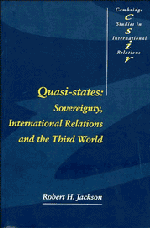Book contents
- Frontmatter
- Contents
- Acknowledgements
- INTRODUCTION
- 1 STATES AND QUASI-STATES
- 2 A NEW SOVEREIGNTY REGIME
- 3 SOVEREIGNTY REGIMES IN HISTORY
- 4 INDEPENDENCE BY RIGHT
- 5 SOVEREIGNTY AND DEVELOPMENT
- 6 SOVEREIGN RIGHTS VERSUS HUMAN RIGHTS
- 7 QUASI-STATES AND INTERNATIONAL THEORY
- CONCLUSION
- Notes
- Index
- CAMBRIDGE STUDIES IN INTERNATIONAL RELATIONS
7 - QUASI-STATES AND INTERNATIONAL THEORY
Published online by Cambridge University Press: 01 June 2011
- Frontmatter
- Contents
- Acknowledgements
- INTRODUCTION
- 1 STATES AND QUASI-STATES
- 2 A NEW SOVEREIGNTY REGIME
- 3 SOVEREIGNTY REGIMES IN HISTORY
- 4 INDEPENDENCE BY RIGHT
- 5 SOVEREIGNTY AND DEVELOPMENT
- 6 SOVEREIGN RIGHTS VERSUS HUMAN RIGHTS
- 7 QUASI-STATES AND INTERNATIONAL THEORY
- CONCLUSION
- Notes
- Index
- CAMBRIDGE STUDIES IN INTERNATIONAL RELATIONS
Summary
CLASSICAL PARADIGMS OF INTERNATIONAL THOUGHT
A world containing both states and quasi-states is different from one containing only states, or states and formal dependencies, and if our theories are to be relevant they must be able to account for the difference. Can our classical theories of international relations make sense of the practices and institutions of the negative sovereignty game? Are their assumptions concerning the nature of states valid in the case of quasi-states? Or are amendments to them and possibly even new theories called for? Before these questions can be addressed it is necessary to be clear what is meant by ‘international theory’. Martin Wight identifies three classical paradigms which have existed in different versions almost as long as sovereign states: ‘realism’, ‘rationalism’, and ‘revolutionism’. At the risk of oversimplification, these terms denote the contrasting ideas of national self-interest and prudent statecraft (Machiavellism), international law and civility (Grotianism), and global political community (Kantianism). They are categorically different modes of thought with their own logic and idiom.
Classical international theory, according to Wight, is preeminently a theory of survival. Being sovereign, states exist in a condition of anarchy and must in the last analysis depend on themselves to survive. Realism conceives of international relations as shaped predominantly if not exclusively by raison d'état: political right is the good of the state and sovereignty is the final word in such matters.
- Type
- Chapter
- Information
- Quasi-StatesSovereignty, International Relations and the Third World, pp. 164 - 188Publisher: Cambridge University PressPrint publication year: 1991
- 2
- Cited by



